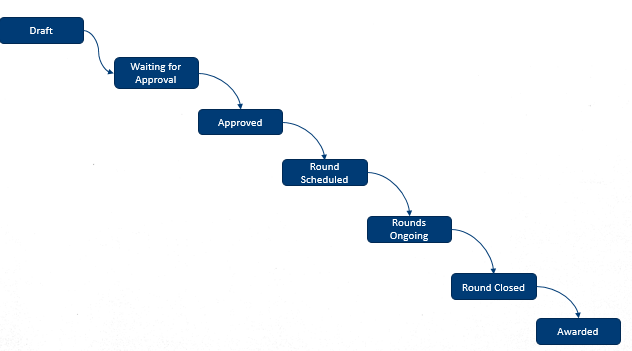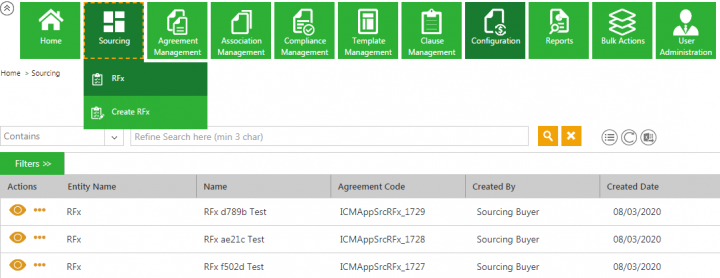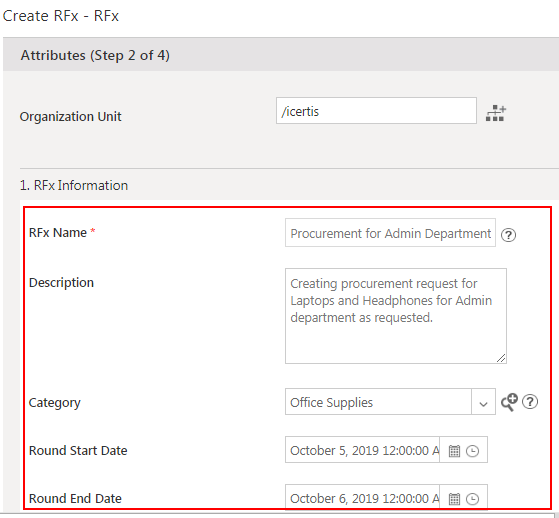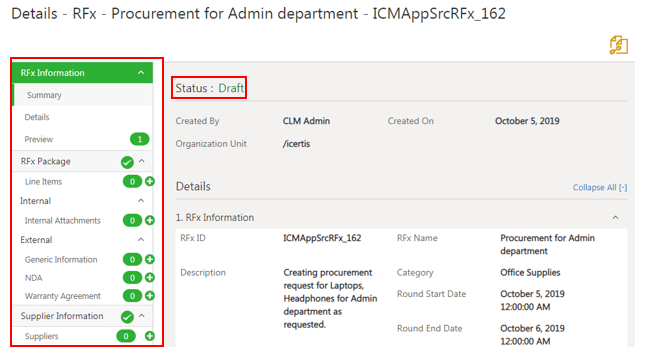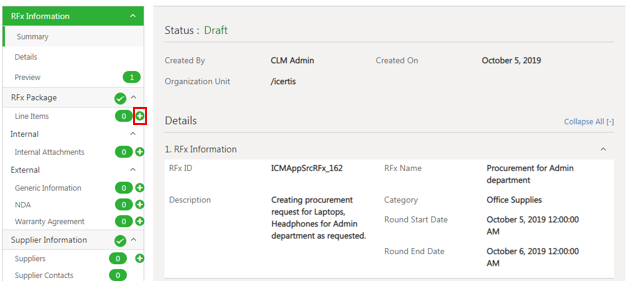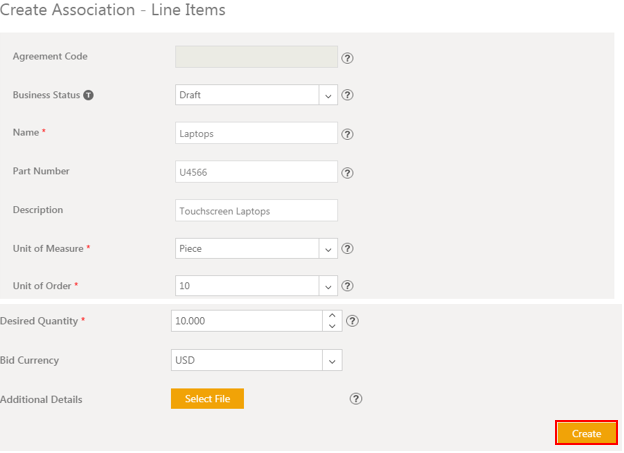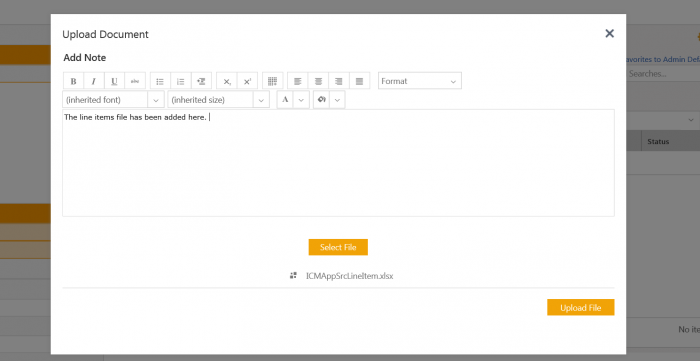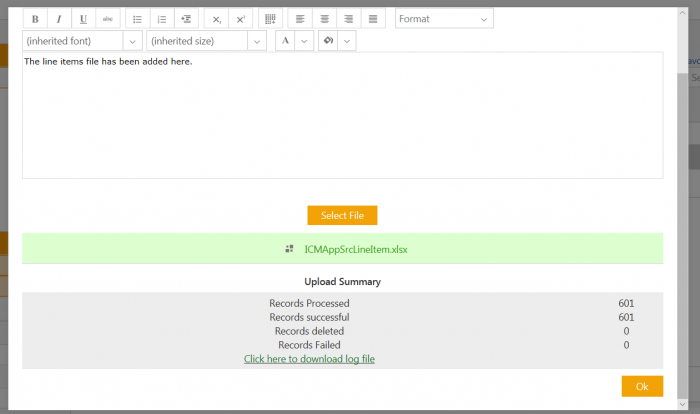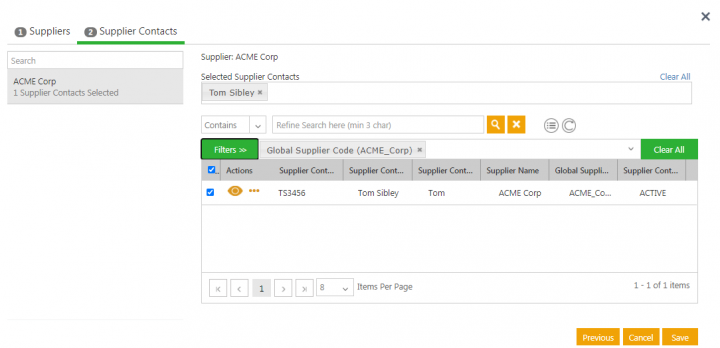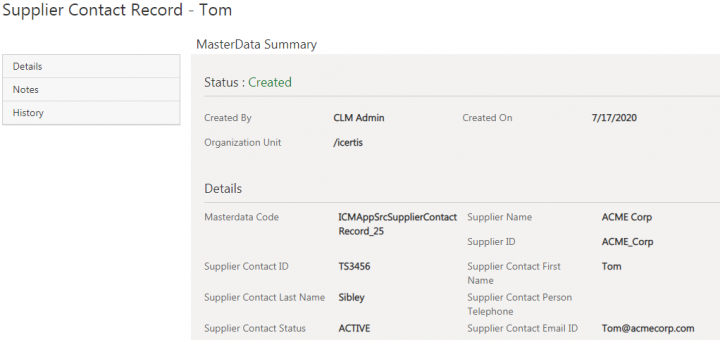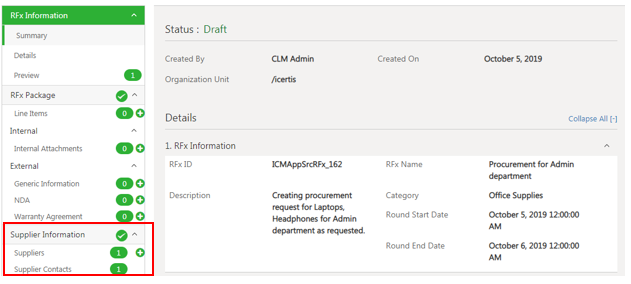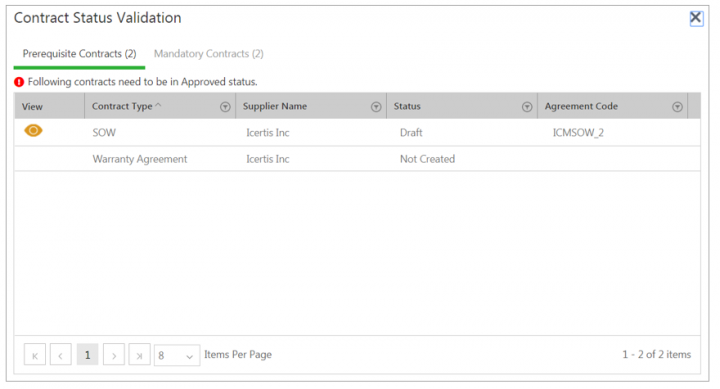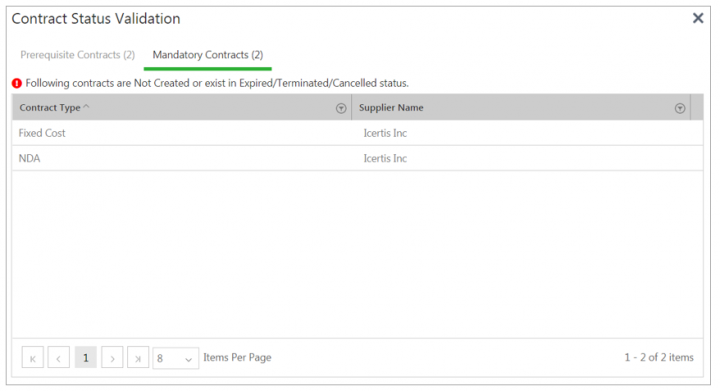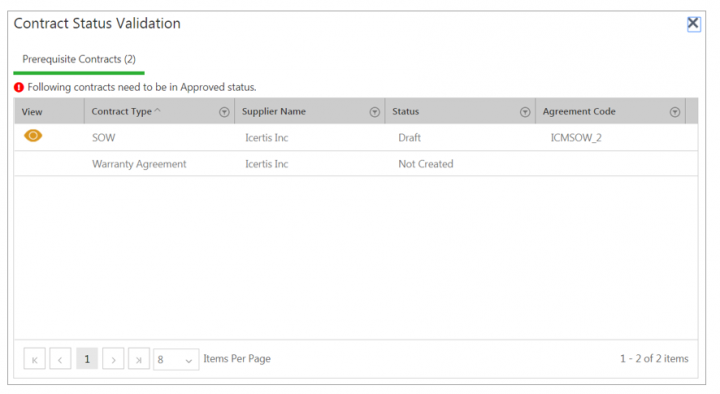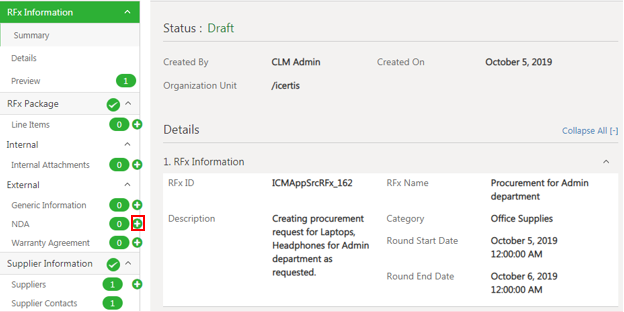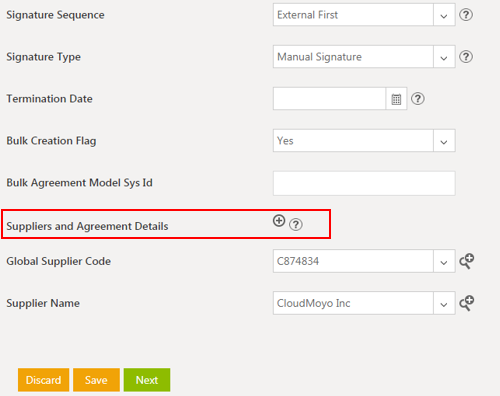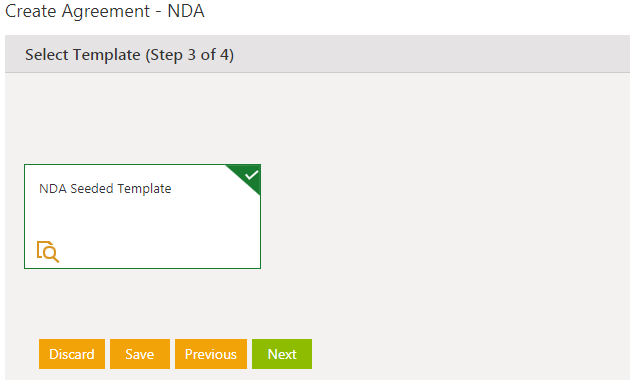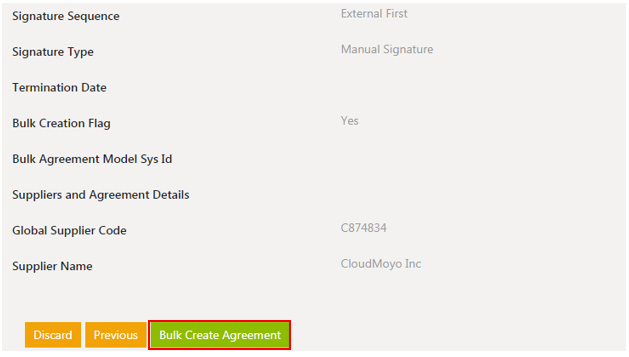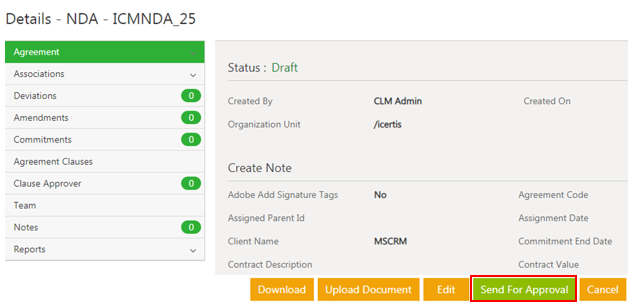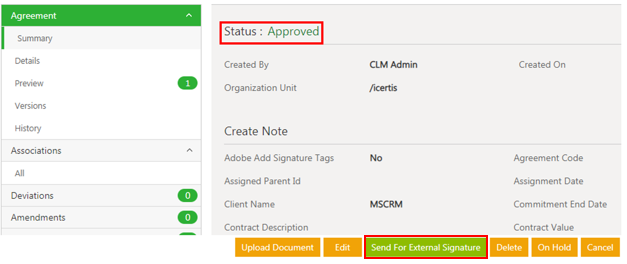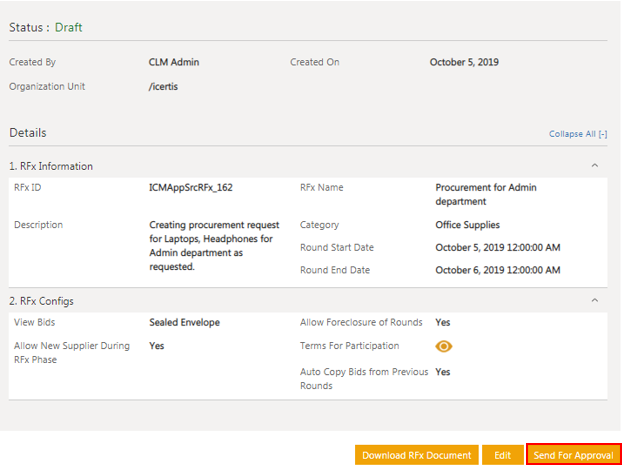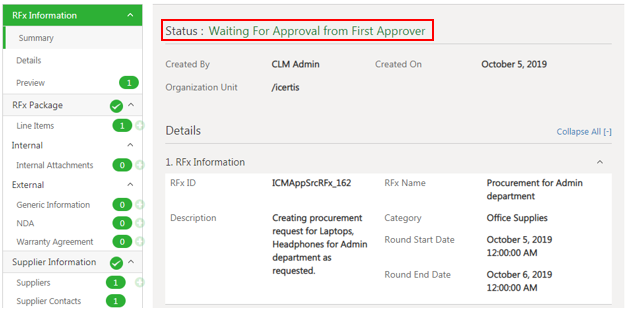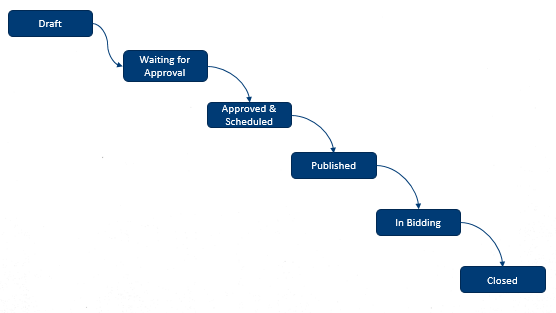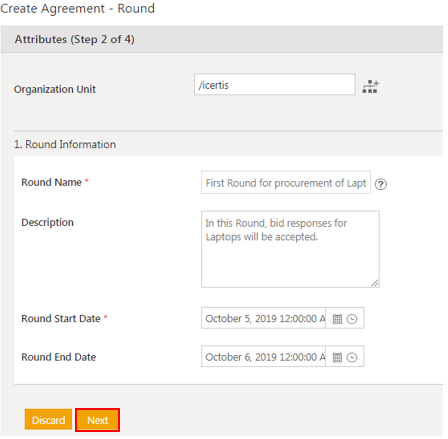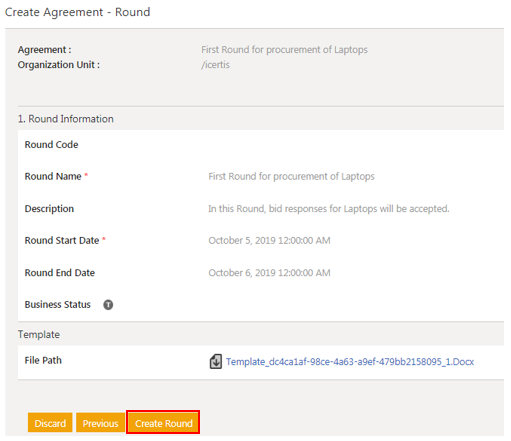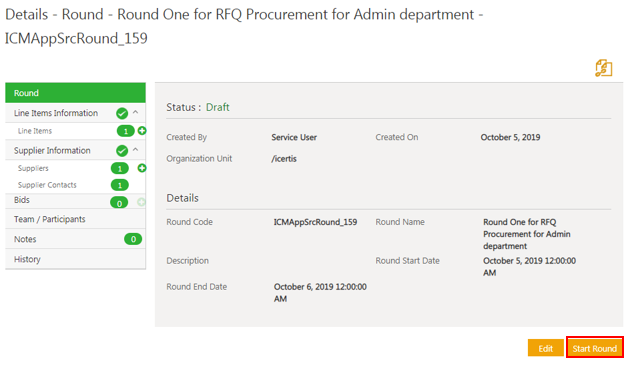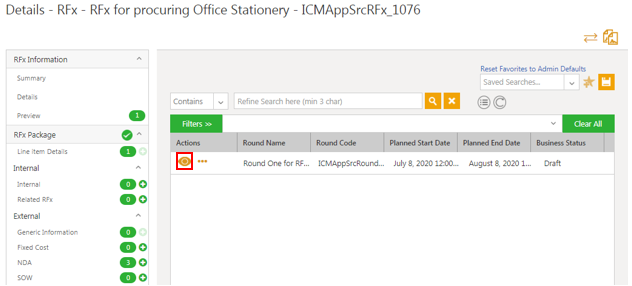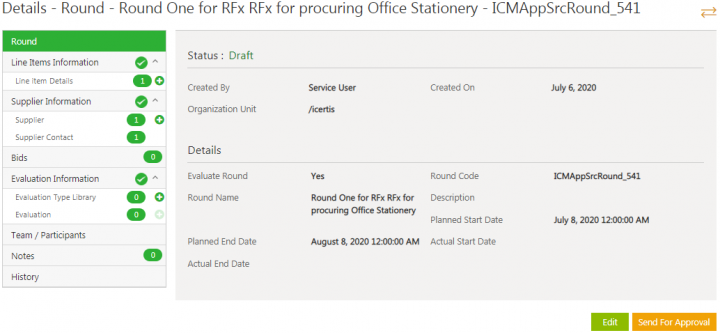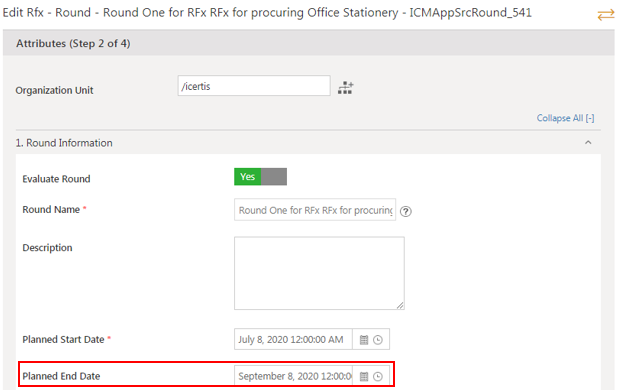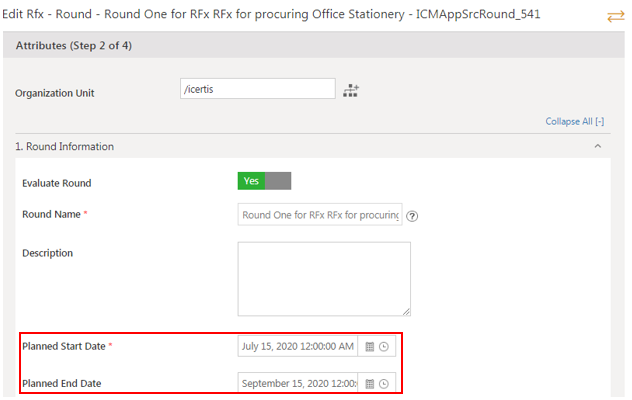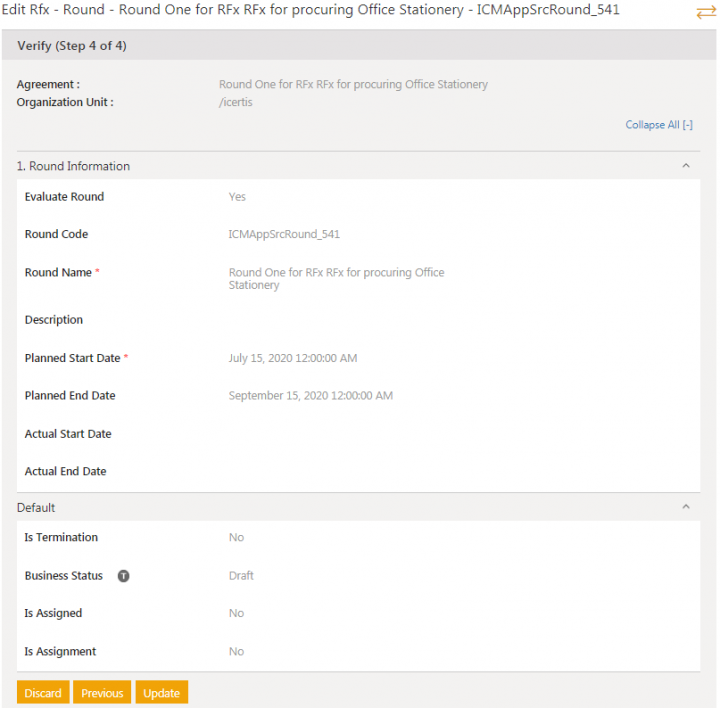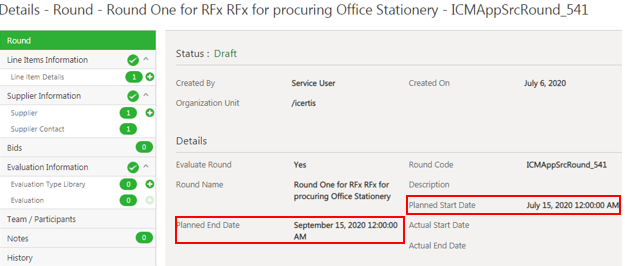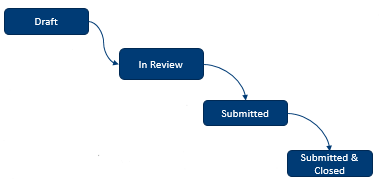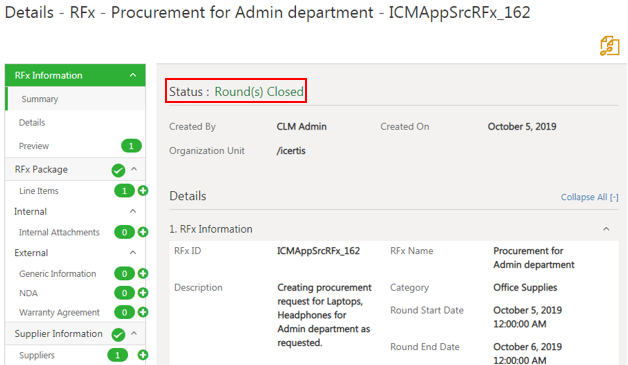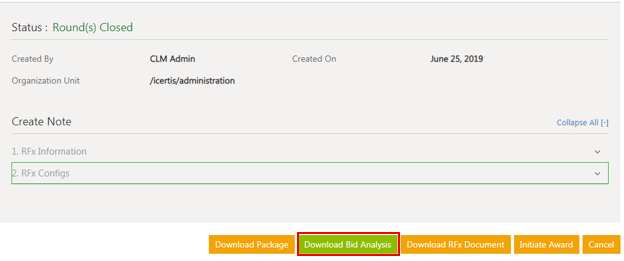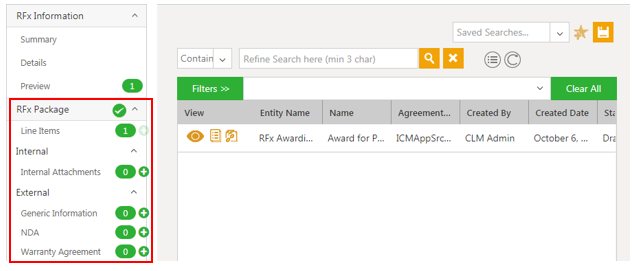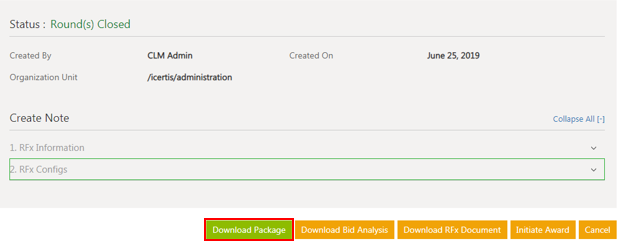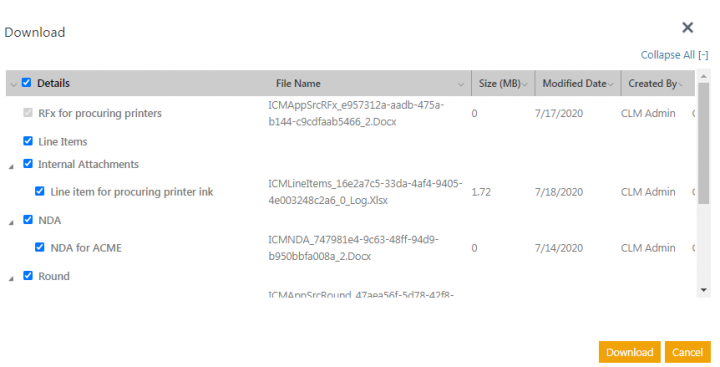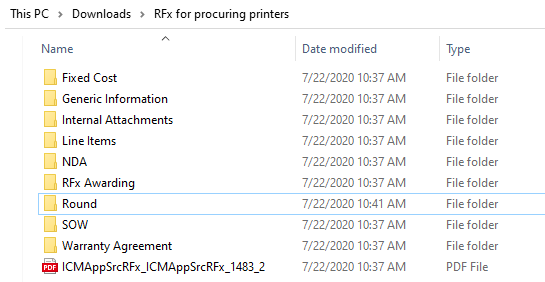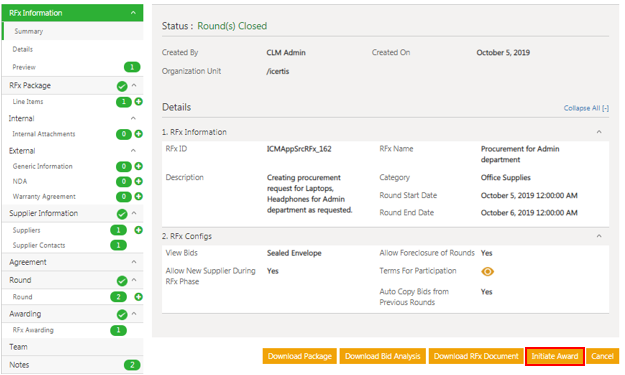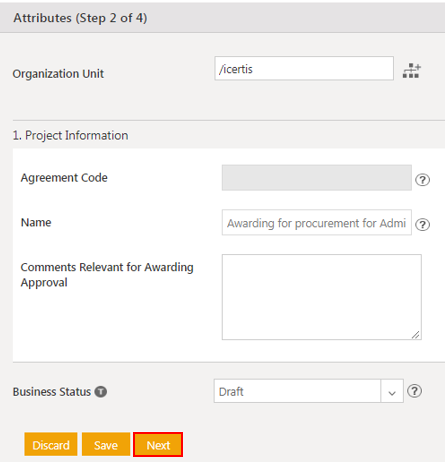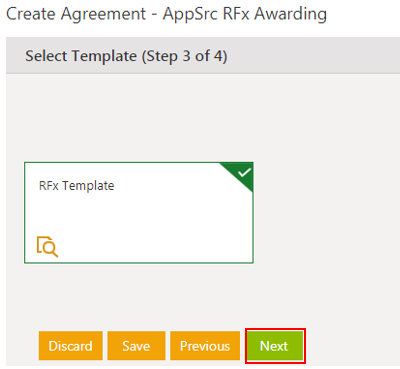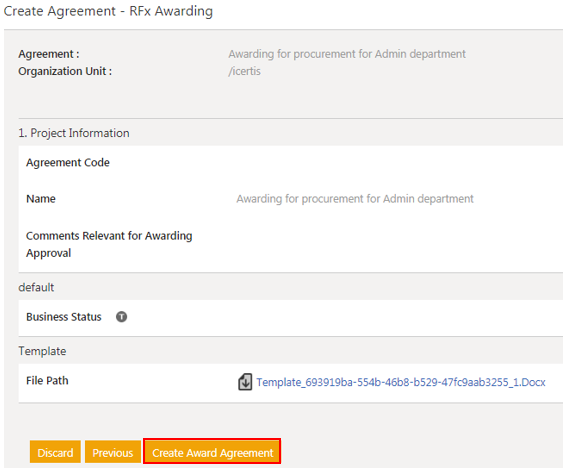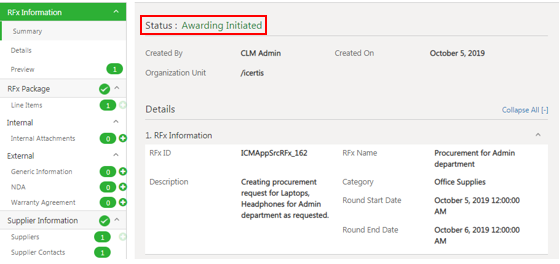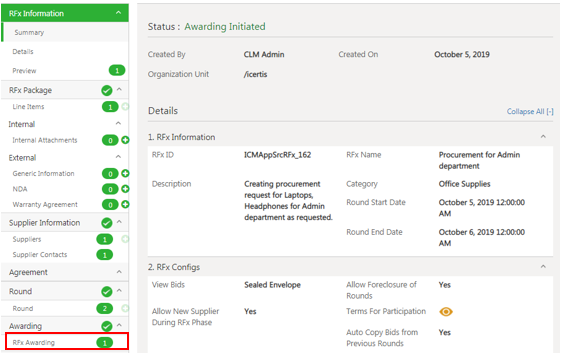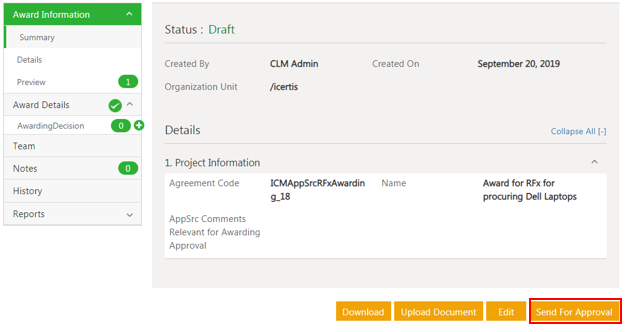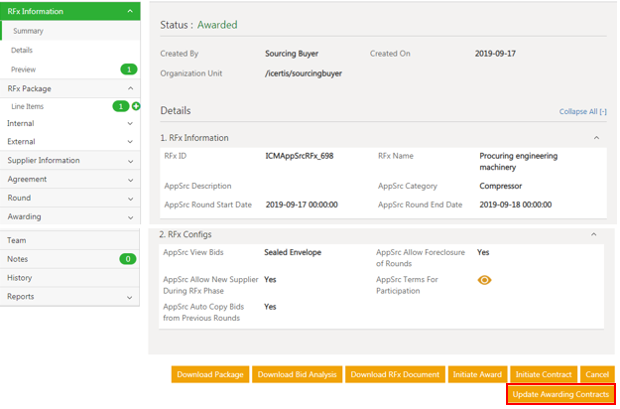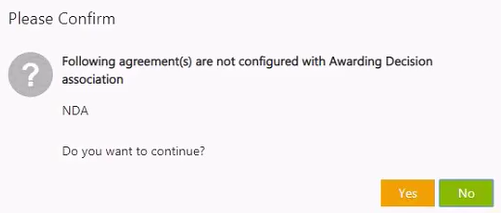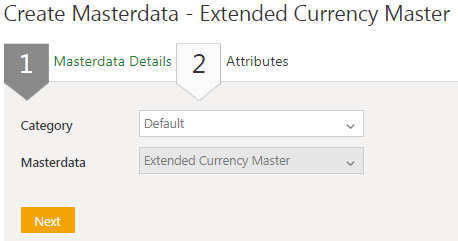| Line 133: | Line 133: | ||
3. '''Click''' ''Create''. The Line Item is created. The Count is updated in the left navigation pane on the RFx ''Details'' page. | 3. '''Click''' ''Create''. The Line Item is created. The Count is updated in the left navigation pane on the RFx ''Details'' page. | ||
<div class="image-green-border">[[File:7.9 Sourcing Adding Line Items 4.png|720px|7.9 Sourcing Adding Line Items 4.png]]</div> <div class="image-green-border"> </div> <div class="note-box">'''Note: '''Repeat steps 1-3 to add more line items.</div> | <div class="image-green-border">[[File:7.9 Sourcing Adding Line Items 4.png|720px|7.9 Sourcing Adding Line Items 4.png]]</div> <div class="image-green-border"> </div> <div class="note-box">'''Note: '''Repeat steps 1-3 to add more line items.</div> | ||
| − | + | Selecting Suppliers | |
| − | + | ||
| − | + | ||
| − | + | ||
| − | + | ||
| − | + | ||
| − | + | ||
| − | + | ||
| − | + | ||
| − | + | ||
| − | + | ||
| − | + | ||
| − | + | ||
| − | + | ||
| − | + | ||
| − | + | ||
| − | + | ||
| − | + | ||
| − | + | ||
Suppliers are the businesses that participate in the RFx bidding process. The suppliers and their information such as ''Names, Addresses, Contact Numbers, Email Addresses,'' and ''Supplier Contacts'' are added to the Masterdata. The name of the existing ''Supplier Contact Name'' has been modified to ''Supplier Contact Full Name. ''For example, John Doe. Buyers can remove the supplier contact from the Supplier Contact page. This updates the count of selected supplier contact.The selected supplier contact’s full name is displayed on the new selected supplier contacts interface.The suppliers and supplier contacts saved earlier are now displayed as pre-selected when adding more suppliers and supplier contacts. | Suppliers are the businesses that participate in the RFx bidding process. The suppliers and their information such as ''Names, Addresses, Contact Numbers, Email Addresses,'' and ''Supplier Contacts'' are added to the Masterdata. The name of the existing ''Supplier Contact Name'' has been modified to ''Supplier Contact Full Name. ''For example, John Doe. Buyers can remove the supplier contact from the Supplier Contact page. This updates the count of selected supplier contact.The selected supplier contact’s full name is displayed on the new selected supplier contacts interface.The suppliers and supplier contacts saved earlier are now displayed as pre-selected when adding more suppliers and supplier contacts. | ||
Revision as of 05:52, 4 August 2020
Contents
- 1 Working with RFx Instances
- 1.1 Creating the RFx Instance
- 1.2 RFx Details Page
- 1.3 Copy RFx
- 1.4 Adding Line Items
- 1.5 Error Validations
- 1.6 Creating Bulk Agreements
- 1.7 Link Existing Contracts
- 1.8 Adding Team Members
- 1.9 Sending the RFx Instance for Approval
- 1.10 Working with Rounds
- 1.11 Working with Bids
- 1.12 Awarding Workflow
- 1.13 Currency Support
- 1.13.1 Configuring the Corporate Currency in Currency Master
- 1.13.2 Configuring the Exchange rate of different currencies
- 1.13.3 Selecting RFx currency and allowed currencies
- 1.13.4 Selecting the exchange rate for RFx
- 1.13.5 Selecting currencies from the list of allowed currencies
- 1.13.6 Using currency conversion rate in Bid Analysis
- 1.13.7 Bidding in multiple currencies
- 1.13.8 Currency information in awarding contracts
- 1.14 Glossary
Working with RFx Instances
The Icertis Sourcing app enables buyers to create and manage end-to-end RFx process. RFx is an acronym for Request for x, where x may stand for Information orProposal or Quotation. Buyers can create an RFx instance, add line items, select suppliers and supplier contacts, create agreements with the suppliers, add team members to the instance for review and approval process and send the instance for approval. Here is the RFx workflow at a glance:
Creating the RFx Instance
1. Click the Sourcing tile on the Dashboard. The Sourcing page opens. A list of all the RFx instances is displayed.
5. Select or enter the values for all the required Attributes in the RFx Information group:
- Enter the RFx Name. For example, Procurement for Admin department.
- Enter the information of the RFx instance in the Description field.
- Select an AppSrc Category from the drop-down. For example, Office Supplies.
- Select the Round Start Date and Round End Date. When you enter the dates, a round is created automatically as soon as the RFx instance is approved.
6. Select appropriate values and settings under the RFx Configs group.
- View Bids: Select an appropriate option from the drop-down. There are following options:
- Sealed Envelope: When you select this option, the bid and bid responses are not visible to the buyer until the round is closed.
- Open RFx: When you select this option, the bid and bid responses are visible to the buyer throughout the duration of the round, as and when the supplier submits the bid.
- Select Yes or No for the following Configuration settings as per your requirement:
- Auto Copy Bids from Previous Rounds: Select Yes if you want to allow copying bids from previous rounds to the new round. This displays the bids from the current rounds and the bid responses with values added in the most recently closed round in Draft state to the suppliers. The default value for this option is set to Yes.
- Allow Foreclosure of Rounds: Select Yes if you want to close the round before the selected round end date. This displays the Close Round button on the Round Details page to close the round manually. If you select No, then the round will be closed automatically only after the selected round end date. The default value for this option is set to Yes.
- Allow New Supplier During RFx Phase: Select Yes if you want to allow new supplier(s) to be added during the entire RFx lifecycle. However, the newly added supplier(s) can participate in a new round only, not in an ongoing round. The default value for this option is set to No.
- Enter the Terms For Participation in the given field. They will be visible to the suppliers only if the buyer adds it when creating the RFx. The suppliers should accept the Terms before they can participate in the bidding process of the RFx. For example, if a supplier has multiple contacts and if one of the contacts accepts the terms for participation, then other contacts are not required to take any action on that and the Terms for Participation will not be displayed to the remaining contacts.
- Allow New Line Item During RFx Phase: Select Yes if you want to allow new line items to be added during the entire RFx lifecycle, However, the newly added line item(s) can be part of a round only before it starts and not in an ongoing round. The default value of this option is set to No.
- Select the following contracts (if applicable) by clicking the drop-down arrow or the Lookup Search icon:
- Associate Contracts: Sourcing app allows the buyers to create contracts such as NDA, for all the suppliers selected when creating RFx. A separate contract will be created for each supplier.
- Mandatory Contracts: It is the contract that should be present for all the suppliers before the RFx moves to the next phase. The value in this option will be populated automatically based on the value selected in the earlier option. You cannot select any value in this option if you don’t select anything in the Associate Contracts option.
- Prerequisite Contracts: The Supplier can access the RFx instance only after it is in Approved state. After the Round is started, a Terms for Participation window is displayed to the supplier with an option to accept or decline. The Suppliers can access the RFx only after they sign the Prerequisite Contract after accepting the terms for participation. If the Suppliers do not sign the contracts a message is displayed by ICM, along with a list of documents asking the suppliers to complete the documents before accessing the RFx.
The values selected in these fields are populated on the RFx Details page under the Agreements tab. This enables the buyer to create Agreements relevant to the RFx that is created.
The attributes for mandatory and prerequisite contracts are interlinked and both the attributes display the list of different contract types that can be associated with the RFx. ICM validates whether the prerequisite and mandatory contracts added to the RFx are in Approved state.
- Primary Currency: Select the primary currency for the RFx. If the user preferred currency is not added in the currency master, then the corporate currency is set as the primary currency of the RFx. For example, if user preferred currency is SGD which is not added in currency master, then the primary currency is set as USD assuming it is set as the corporate currency.
- Allowed Currency: Select the allowed currency for the RFx. This is the currency allowed by the buyers for the suppliers operating from a different country. The selected allowed currencies can be used by suppliers for bidding. Suppliers can view the newly added currencies even when the round is Open and select them as required. Buyers can update the allowed currency at any time using Modify RFx option. The allowed currencies cannot be deleted after the RFx is approved.
7. Click Next. The Select Template (Step 3 of 4) page opens. This is an optional step depending upon how the application is configured. Usually there would be only one template associated with the RFx that is selected automatically. However, multiple templates can be configured in ICM as per the business requirement.
RFx Details Page
Buyers can view the current status and details of the RFx in various sections of the left navigation pane on RFx Details page. Buyers can also perform a variety of actions based on the current state of the RFx.
Here is a brief description of the options in the left navigation pane of RFx Details page.
- RFx Information: This section displays the basic details of the current RFx instance. It has the following sub-sections.
- Summary: Displays the name of the RFx instance (that is added while creating), who created it, and RFx instance details.
- Details: Displays the details specified while creating the RFx instance.
- Preview: Displays how the RFx document would actually look. Click the click here in To see full document click here to download and view the full document in pdf format.
- RFx Package: This section displays the following details.
- Line Items: Click this option to view the list of line items associated with the RFx. Click the plus icon next to Line Items on RFx Details page to add a new line item.
- Internal Attachments: Displays the list of existing internal attachments associated with the RFx. Internal attachments are associated documents uploaded by the buyers and only available to the buyer team. Click the plus icon next to internal attachments to add new to the list.
- External Attachments: Displays the list of existing external attachments associated with the RFx. External attachments are associated documents uploaded by the buyers and available to both buyers and suppliers. Click the plus icon next to external attachments to add new to the list.
- Supplier Information: Displays the list of existing suppliers and allows buyers to add new suppliers along with their contact information.
- Suppliers: Displays the list of suppliers added to the RFx created by the buyer. Click the plus icon next to Suppliers to add a new supplier.
- Supplier Contacts: Displays the list of supplier contacts that are populated automatically after you select the suppliers in the previous step.
- Agreements: Displays all the agreements that were selected initially when creating the RFx.
- Collaboration: Allows the internal or external team members to communicate with other internal or external team members by creating topics and posting messages in it.
- Round: Displays the list of rounds associated with the RFx along with their current state. Click the plus icon next to Round to add a new round.
- Awarding: Displays the RFx instance awarded to the supplier. After the rounds are closed and awarding is initiated by the buyer, an awarding object is created.
- Team: Displays the members added to the team for this RFx instance. Click the plus icon to add new team members to the RFx.
- Notes: Displays the additional information about the RFx if it is added.
- History: Displays how the RFx has progressed till now. The actions performed by the buyer are displayed by the buyer on the RFx instance are displayed under History in the left navigation pane on RFx Details page.
Buyers can perform the following actions from the RFx Details page:
- Download RFx Document: Click this button to download the RFx document in Microsoft Word format. The downloaded document is based on the template selected while creating the RFx instance.
- Edit: Click this button to go back and make changes to the RFx that you created.
- Send for Approval: Click this button to send the RFx instance for approval.
- Download Package: Click this button to download the RFx instance along with all its associations. You can select specific associations that you want to download or select the RFx instance checkbox to download the RFx package. RFx package is downloaded as a zip file that contains all the attachments relevant to the RFx. When the zip file is exported on user’s local machine, a folder structure is created that resembles the RFx structure, and the files are located in the respective locations.The files names will be the same when downloading or uploading them to ICM. The files will be downloaded as per the defined folder structure and folder naming conventions which helps users to easily identify files under individual folders of the RFx and avoid any discrepancies. The folder names for associations are now same as the contract type display names such as line items, internal attachments, round, bid response and so on.Downloading the RFx package displays the folders for RFx, round, bid, RFI Response as they are displayed in ICM. The rounds and bids folders are merged in a single folder and the template files are added to the relevant round or bid folder. This is applicable for RFx and RFI.
- Delete: Click this button to delete the RFx instance. After deleting the RFx instance, the Sourcing page opens and the deleted RFx will not be available on the user interface.
Copy RFx
Buyers can now:
- Copy the Sourcing event.
- Select and copy associations such as line items, questions, questionnaires, suppliers, supplier contacts, internal and external attachments, and commitments.
- Copy the RFx association team based on the configured rule. Copying any user (other than the primary owner) makes that user a primary owner of the RFx, and the user who was initially the primary owner then becomes the secondary owner of the copied RFx.
Additionally, global sourcing involves globally distributed buyers team. This team may clone the sourcing event at the regional level to identify and shortlist suppliers and link the sourcing events with one another. Linking the copied RFx to the original version can be achieved by selecting Yes for Link To RFx.
Note: This depends on the RFx configuration.
You can copy an RFx from the:
- Sourcing index page
- RFx details page
To copy an RFx from the Sourcing index page:
1. Click dots next to the RFx on the Sourcing index page and then click Copy Record. The Copy Record window opens.
2. Select Yes next to Link To RFx that is being copied.
3. Select the checkbox next to the RFx that you want to copy and then click Copy to copy the RFx without the associations.
4. Select the Associations checkbox to select all the associations of the RFx to copy. You can select specific associations that you want to copy.
5. Click Copy. The RFx copy is created and RFx Details page opens with the status of the RFx as Draft.
The RFx can also be copied from RFx Details page by following steps 2-6 above.
Adding Line Items
You can add line items at any stage of the RFx instance depending upon RFx configuration settings. Line items are products that the buyer is looking to procure through the RFx instance. When you create the RFx instance, the RFx Details page opens with the RFx status displayed as Draft. You can use the left navigation pane to add one or more line items. You can also add line items using Microsoft Excel import by selecting the file from your local machine and uploading it to ICM Sourcing.
To add line items:
1. Click the Create Association icon next to Line Items under the RFx Package tab. The Line Items window opens.
2. Enter the values in the following fields:
- Name: Enter the name of the items you want to procure. For example, Laptops.
- Part Number: Enter the specific details of the item. For example, Model number.
- Description: Enter more information of the item.
- Unit of Measure: Select appropriate unit of measure depending upon the item. For example, Piece, Each, Pack, etc.
- Unit of Order: Select the unit of order you want to procure. For example, in the multiples of 10s or 100s etc.
- Desired Quantity: Enter the quantity of the item you wish to procure.
- Bid Currency: Select the currency from the drop-down.
- Additional Details: You can upload a file that contains additional details about the item.
3. Click Create. The Line Item is created. The Count is updated in the left navigation pane on the RFx Details page.
Selecting Suppliers
Suppliers are the businesses that participate in the RFx bidding process. The suppliers and their information such as Names, Addresses, Contact Numbers, Email Addresses, and Supplier Contacts are added to the Masterdata. The name of the existing Supplier Contact Name has been modified to Supplier Contact Full Name. For example, John Doe. Buyers can remove the supplier contact from the Supplier Contact page. This updates the count of selected supplier contact.The selected supplier contact’s full name is displayed on the new selected supplier contacts interface.The suppliers and supplier contacts saved earlier are now displayed as pre-selected when adding more suppliers and supplier contacts.
Now, the buyers can use any supplier and supplier contact masterdata contract type to add suppliers.
The supplier contact full name column will be displayed by default on:
- Supplier Contact selection page
- Details page of Supplier Contact
- Grid view of the supplier contact association
This makes it is easier for buyers and Administrators to identify and select the correct supplier if there are multiple suppliers with the same first name. This is applicable for bulk agreements too.
To add suppliers:
1. Click the Create Association icon next to Suppliers. The Supplier window opens.
2. Search for the desired supplier(s) or select the suppliers from the displayed list under the Supplier tab.
3. Click Next. The Supplier Contacts tab opens displaying the contact details of the suppliers.
4. Click the View Record icon next to the supplier’s name. The supplier’s contact details are displayed.
5. Select the desired Supplier Contact(s).
6. Click Save. The selected supplier(s) and supplier contact(s) are added to the RFx instance. The count is updated under the Supplier Information tab in the left navigation pane.
Error Validations
Buyers have the option to select mandatory and pre-requisite contracts while creating the RFx. The attributes for mandatory and prerequisite contracts are interlinked. The prerequisite contracts are derived from the mandatory contracts. So, if the buyers select the following contracts – NDA, Warranty Agreement, Fixed Cost Agreement as mandatory, then they have the option to select one or more, or all as prerequisite contracts.
Suppose the NDA is the prerequisite contract for accessing the RFx, then the validations are done such that ICM expects that the Instance of an NDA contract type for all the suppliers is associated with the RFx and contract should be in Approved state. Similarly, if Contract Types are made mandatory, then the instances of these should exist before RFx is sent for approval.
Buyers will now receive a system message when:
- Sending an RFx for approval in case prerequisite contracts are not in the Approved status for suppliers.
- Sending an RFx for approval in case mandatory contracts are either not created or exist in one of the states - Cancelled, Expired, or Terminated for suppliers.
Buyers will be able to view the validations for the prerequisite and mandatory contracts for the shortlisted suppliers only.
For a shortlisted supplier, if all the prerequisite contracts are inactive or if any one of the contracts is active but not in Approved or later state, then the validations will be displayed.
For example, if there is one shortlisted supplier with two prerequisite contracts NDA 1 (in Draft state) and NDA 2 (in Waiting for Approval) state, then validations will be displayed.
The validations will not be displayed for shortlisted suppliers when at least one active prerequisite contract exists, and all such contracts are in Approved or later state.
For example, if there is one shortlisted supplier with two prerequisite contracts NDA 1 (in Approved state) and NDA 2 (in Expired state), no validations will be displayed since one of the two prerequisite contracts (NDA 1) is in Approved or later state.
To view the error validations:
2. Click the Mandatory Contracts tab next to the Prerequisite Contracts tab.
A message is displayed as above indicating that the contract types are either not created or exist in one of the statuses as Expired, Terminated, or Cancelled. In this example, the contract types Fixed Cost and NDA are not created.
3. Click the plus icon to the mandatory contract that was configured when creating the RFx and create the mandatory contracts using the process to create the bulk agreement.
4. Click Send for Approval. The Contract Status Validation window opens displaying only the Prerequisite contracts.
Creating Bulk Agreements
The Sourcing App offers you a convenient way of creating bulk agreements with the suppliers, without having to move out of RFx instance that you are working on. The agreements must be already configured in ICM. These agreements may be made mandatory for the supplier to sign before the supplier can participate in the RFx. The RFx displays all the agreements created from the RFx and they have all the agreement information. This allows the buyer to conveniently navigate between the RFx and the agreement associated with the RFx.
To create an agreement:
1. Click the Create Association icon next to the agreements in the left navigation pane on the RFx Details page. For example, NDA, Warranty Agreement.
2. The Attributes (Step 2 of 4) page opens in the new browser tab.
3. Enter values for all the attributes, some of which may be mandatory.
4. Click the Select Multiple Suppliers icon next to Suppliers and Agreement Details. The Supplier page opens.
5. Repeat steps 2 to 6 from the Selecting Suppliers section to add a supplier.
6. Click Next. The Select Template (Step 3 of 4) page opens.
7. Select a Template.
8. Click Next. The Verify page opens. Verify all the information you have entered.
9. Click the Bulk Create Agreement button. The agreement is created.
10. Click the View Record icon next to the NDA instance on the Sourcing page. The NDA’s Details page opens with the NDA in the Draft state.
After the Agreement is created for a supplier, you can proceed with the agreement workflow as configured. For example, you can send the agreement for approval.
11. Click the Send For External Signature button on the Details page. The agreement is sent to the supplier(s) for signatures. The status of the agreement changes to Executed when all the suppliers sign the NDA.
Link Existing Contracts
Buyers can now:
- Link existing supplier contracts (prerequisite, mandatory, associated contracts) allowing buyers to leverage existing contracts with suppliers.
- View the contracts of the supplier when creating the bulk agreement that allows assigning any supplier contact as a signatory for the agreement.
- View the signatory of the prerequisite contracts that allows the suppliers to connect with the signatory if there are any issues with the contracts.
- Send the agreements for approval in bulk that helps avoid sending the agreements for approval individually.
- Select the new signature type Click to Sign allowing suppliers to participate in the sourcing event by previewing, accepting, or declining the terms and conditions set by the buyer.
To link existing contracts:
1. Click the Create Association next to the agreements in the left navigation pane on the RFx Details page. For example, NDA, Warranty Agreement. The Please Confirm window opens.
2. Click Existing Contracts. The Select existing contracts to link to RFx page opens.
3. Select the contract that you want to link with the RFx and click Link Contracts.
The selected contract is linked with the RFx.
Adding Team Members
A team of Approvers, Reviewers, and Observers can be added to the RFx instance for completing the workflow.
To add team members:
1. Click the Team tab on the RFx Details page. The Add Team page opens in the right pane.
2. Click the Add Team icon. The Select User window opens.
3. Enter the search term in the Search User field to search for a desired user.
4. Select a User from the displayed user tiles.
5. Select a Role. For example, Approver, Business Owner, Observer, etc.
6. Select or enter the Step Number if you select Approver in the Select Role field.
7. Enter a comment in the Add Note field (optional). You can see this comment under the Notes tab.
8. Select the Send Notification checkbox if you want to the user to receive a notification of the task.
9. Click Add. The User has been added successfully message is displayed.
Sending the RFx Instance for Approval
The RFx instance must be in Approved state before a round is created automatically and the RFx workflow can be completed.
1. Click the Send For Approval button on the RFx Details page. The RFX instance is sent for approval to the approver(s) you have selected in the Team.
The status changes to Waiting For Approval. A task is created for each approver.
When all the approvers approve the RFx instance, the status changes to Approved. After the RFx is approved, the first round is created automatically.
Working with Rounds
One cycle of seeking proposals/bids from suppliers and evaluating them is referred to as a round. A complete Sourcing event may comprise of multiple rounds. The first round is created automatically (if the start and end dates are entered) as soon as the RFx instance is approved. You can see the round on the RFX Details page. You must open the round instance and fill in additional details. There can be multiple rounds for one RFx instance.
Here is the round workflow at a glance:
Starting the Scheduled Rounds
You can schedule a round by entering the Round Start Date and End Date when creating the RFx instance. The buyer must click the Start Round button on the Round Details page to start the round.
To start the round:
1. Click Round on the RFx Details page. The auto created round instance is displayed.
2. Click the View Record icon. The Round’s Details page opens with the round in Draft state.
3. Click the Start Round button to start the Round. The status of the round changes to Approved when the round is approved and the status of the RFx changes to Round(s) Ongoing.
Creating Rounds
The buyer can also create a round manually if they need to conduct multiple rounds with the supplier. The buyer can create the round manually only if the RFx instance is in Approved state.
To create a round (manually):
1. Click the Create Association icon under the Round tab on the RFx Details page. The Create RFx -Round page opens.
2. Click the Organization Unit icon to select the Organization Unit.
3. Enter an appropriate name for the round.
4. Enter relevant details in the AppSrc Description field.
5. Select a Round Start Date. This field is already populated with the current date. You can select a different date and time if required.
6. Select a Round End Date and time.
7. Click Next. The Verify page opens. Verify all the information.
8. Click the Create Round button. The Round’s Details page opens. The round is now created in Draft state.
9. Click the Start Round button to begin the Round. The status of the round changes to Approved and Scheduled. When the round is approved the status changes to Approved and Scheduled. When the current date is equal to start date of the round the status changes to Published.
Editing Round start and end dates
Buyers can now:
- Edit the round start and end date when the round is in one of the below states:
- Draft
- Waiting for Approval
- On Hold
- Open
- Approved
To edit the round start and end date:
1. Click Round on RFx Details page. The list of rounds is displayed.
2. Click the View Record icon next to the round for which you want to edit the start and end date. The round Details page opens and displays the existing start and end date of the rounds.
4. Make the necessary changes to the start and end date of the round depending on the state of the round. You can edit just the time of start and end date of the round and not required to change the date always. For example, the Planned Start Date was July 8, 2020, 12:00 AM and the Planned End Date was August 8, 2020 12:00 AM.
- Open: You can make the changes only to the Planned End Date of the round. For example, you can change the Planned End Date to September 8, 2020 in place of the earlier date August 8, 2020
- Approved/On Hold: You can make the changes to the Planned Start Date and Planned End Date values of the round. For example, you can change the Planned Start Date to July 15, 2020 in place of the earlier date July 8, 2020 earlier and Planned End Date to September 15, 2020 as against August 8, 2020 earlier.
5. Click Update on round Verify page.
The round Details page opens and displays the edited round start and end date.
Working with Bids
A bid is a collection of quotes for each Line Item. The system generates bids when a round is in Published state. The supplier can view the bids that were submitted in the previous rounds if the buyer selects Yes in the AppSrc Auto Copy Bids from the Previous Round option when creating the RFx.
Depending upon how the RFx instance is configured in the organization, suppliers must sign all the prerequisite agreements before submitting the bid responses. The suppliers won’t be able to view the RFx instance until the prerequisite agreement is in Executed state.
Here is the bid workflow at a glance:
Submitting Bids
A supplier can submit bid responses when the round is published.
To submit bid responses:
1. Click the Sourcing tile on the Dashboard after logging on to ICM. The Sourcing page opens. This page displays a list of all the RFx instances, rounds, and bids that the supplier is a part of.
2. Click the View Record icon next to the bid that you want to respond to. The Bid’s Details page opens with the bid is in Draft state.
3. Click Bid Response under Quotation Details tab. The bid response is displayed in the grid along with its details such as Item Name, Quotation ID etc. As the buyer had added two line items, the count is updated to 2 next to Bid Response.
4. Click the Edit icon. The Edit Bid Response window opens. It displays the information of the line item given by the buyer.
5. Enter values for the following fields:
- AppSrc Base Price: The price for one unit of the product mentioned in the line item.
- AppSrc Total Price: Calculated automatically by ICM depending upon the buyers requirement of the number of pieces and the base price you entered.
- AppSrc Quote Currency: Select the appropriate currency from the drop-down.
6. Click the Update button. The bid response is updated. The Bid Response window closes.
7. Click Submit on the Bid Details page. The bid response is now submitted to the buyer. The status of the bid changes to Submitted.
After submitting bids, suppliers cannot edit bids. To edit the bids, the suppliers must click Withdraw. This changes the status of the bid to Withdrawn. Suppliers can revert withdrawal by clicking Revert Withdrawal. They can also edit their bids and submit again.
As soon as one supplier submits a bid, the status of the round changes to In Bidding. When all the bid responses are submitted, the buyer can:
- Manually close the round by clicking the Close Round button on the Round’s Details page if the AppSrc Allow Foreclosure of Rounds is toggled to Yes when creating the RFx by the buyer.
Or
- The round closes as per the scheduled Round End Date and Time.
Buyers can now view the status of bids for each supplier regardless of whether the RFx is an open or sealed envelope depending on the status of the bid. These statuses include:
- Submitted and Closed: Buyers and the user assigned as a surrogate buyer can view the bids in Submitted status, and the rounds are closed.
- Declined: The suppliers declining the bid cannot participate in the upcoming rounds. The status of the bid is displayed according to the type of RFx when the bid is in Declined state.
- Open RFx: Buyers and the user assigned as a surrogate buyer can view the round in Open and Closed state.
- Sealed Envelope: Buyers can view the bid when the state of RFx changes to Closed state. The suppliers who declined the bid cannot participate in the ongoing or upcoming rounds nor can they revert decline to participate in the round again.
Buyers cannot view the status of the bids depending on the following status of the bid.
- Not Submitted and Closed: Buyers and the user assigned as a surrogate buyer cannot view the bid response when the bid is not submitted, and the round is closed.
Bid Analysis
It is the process of analyzing supplier responses with an intent to compare one against the others along the evaluation criteria. When all the desired Bid Responses are received, you can view and analyze all the responses to be able to take informed decision.
At least one round should be completed for conducting bid analysis, otherwise the user gets an error message indicating that the round must be started to download bid analysis. For an RFx with Sealed Envelope, at least one round must be in Closed state to download the excel sheet for bid analysis.
The bid analysis Excel will contain all the bids, for all the suppliers, for all the rounds. The bid analysis will also contain currency information of bid currency and RFx primary currency, along with bid analysis attributes converted to RFx primary currencies. An attribute for bid analysis is defined in the masterdata. Users can add the bid analysis attribute for each RFx item and specify its value while creating an RFx or associated document. This helps the buyer to get all the information in the Excel sheet to be able to easily analyze a bid for a supplier.
Buyers can now:
- Download bid analysis excel on bid level and round level. When bid analysis is performed on bid, the downloaded bid analysis Excel it will include the responses for a specific respective supplier whose bid was chosen. Whereas, when bid analysis is performed on round level, downloaded bid analysis Excel will include the bid responses data for all the suppliers present in the round.
Enter the values for bid analysis attributes and upload the bid analysis Excel sheet. The value of bid analysis attributes will be updated in the bid response.
Downloading and Uploading Bid Analysis for round
1. Click the Bid Analysis button, on the Round Details page. The Bid Analysis page opens.
2. Click Download File. The Excel file of Bid Analysis is downloaded.
3. Open the downloaded Excel. View the Bid Analysis attributes.
Once downloaded, you can edit the Bid analysis attributes such as Bonus, Net Landed Cost, Difference.
4.Enter Bid Analysis attribute values. For example: Enter value of Bonus as 2.44 instead of 1.05.
5.Click Save to save the file.
6. Click Select File To Upload on the Bid Analysis window. The updates will be made, and theBid Analysis has been Saved successfully message will be displayed in the Upload Summary section.
7.Click ok.
Downloading and uploading bid analysis for bid:
1.Click the Bid Analysis button, on Bid Details page.
2.Click Download File. The Excel file of Bid Analysis is downloaded.
3. Open the downloaded Excel file. View the Bid Analysis attributes.
You can add the bid analysis attribute for each RFx item and specify its value while creating an agreement or associated document.
If you add any invalid value in Bid Analysis attribute, error validation message will be displayed in last column.
For example: Enter hdsjbvshd in Bonus, and enter any random value in Net Landed Cost chdsjbcs, then Error message is displayed, indicating that Bonus and Net landed Cost are invalid.
You can not edit other attributes such as Freight, Insurance, landed Cost.
To analyze bid response:
1. Click the Download Bid Analysis button on the RFx Details page. An Excel sheet containing the bid responses is downloaded.
2. Open the Excel sheet. You can view the all the data collected from the bid responses such as Supplier ID, Item Name, Item Description, etc.
Downloading Associations and Attachments
The ICM Sourcing app offers an ability to download either all or selected associations (line items, attachments, supplier documents) and attachments (files uploaded to the RFx instance) for review and analysis purposes. This is applicable for all types of RFx instances and all documents (buyer’s and suppliers). The application retains the file names of the attachments as they were while uploading them so that they could be recognized easily.
The files names will be the same when downloading or uploading them to ICM. The files will be downloaded as per the defined folder structure and folder naming conventions which helps users to easily identify files under individual folders of the RFx and avoid any discrepancies. The folder names for associations are now same as the contract type display names such as line items, internal attachments, round, bid response and so on.
Downloading the RFx package displays the folders for RFx, round, bid, RFI Response as they are displayed in ICM. The rounds and bids folders are merged in a single folder and the template files are added to the relevant round or bid folder. This is applicable for both RFx and RFI.
The attachments can be viewed under RFx Package tab on the RFx Details page.
To download associations and attachments:
1. Click the Download Package button on the RFx Details page. The Download window opens displaying all the Associations and attachments.
2. Select the items you wish to download.
3. Click Download. The selected files are downloaded in a zip file.
Awarding Workflow
You can initiate the Awarding workflow after receiving all the required bid responses and after all the rounds are in Round(s) Closed state. Buyers can award multiple suppliers using Excel upload.
Creating Awarding Instances
To create award instances:
1. Click the Initiate Award button on the RFx Details page. The Attributes (Step 2 of 4) page opens.
2. Select the Organization Unit.
3. Select the Business Status (Default value - Draft).
4. Enter the Name of the Awarding instance.
5. Upload an AppSrc Supporting Document, if any.
6. Click Next. The Select Template (Step 3 of 4) page opens.
7. Select the template.
8. Click Next. The Verify page opens. Verify all the information.
9. Click the Create Award Agreement button. The RFx Details page opens with the status Awarding Initiated. The RFx Awarding instance is created with the status Draft.
Awarding Decision
After creating the Awarding instance, you must create an Awarding Decision as an Association. The awarding decision contains all the details of all items and the Supplier(s) who are being awarded the RFx along with the other details such as award quantity and price.
To create awarding decision:
1. Click RFx Awarding on the RFx Details page. The awarding instance is displayed in the right pane.
2. Click the View Record icon. The Awarding Details page opens with the status Draft.
3. Click the Create Association icon next to AppSrc Awarding Decision. The Awarding Decision window opens.
4. Click the icon next to Download File. The Awarding Decision excel sheet is downloaded on your computer. This excel sheet displays the information such as the price submitted by the supplier, the quantity of line items, currency, etc. This excel sheet contains all the bids for all suppliers for all rounds.
5. Enter values for the required fields entered on Excel.
- Awarded Quantity: Enter the quantity you are procuring through this awarding decision.
- Awarded Percentage: Enter a value for Awarding Percentage. Awarding can be given to one or more suppliers at a time. For example, the selected supplier may get 60% of the order. If it’s not being shared, it is 100 percent. This process is known as Split Awarding.
Some of the important points to note when splitting the award between multiple suppliers are:
- The awarding percentage will be calculated automatically up to 2 decimal places when you add the awarding quantity.
- The awarding quantity will be calculated automatically based on the percentage entered to the nearest integer.
- If you want to delete a particular Line Item, delete the records from Awarded Quantity and Awarded Percentage columns.
6. Click Select File to Upload and then click Upload File to upload the file. The awarding decisions are created automatically after uploading the File.
Sending the Awarding Instance for Approval
After creating the awarding instance and adding the awarding decision, you must send the awarding instance for approval.
To send the awarding instance for approval:
1. Click Publish on the Awarding Details page. The Published Successfully message is displayed.
2. Click Send For Approval. The status of the Awarding instance changes to Approved once the Approver(s) approve it.
After the awarding instance is approved, the status of the RFx instance changes to Awarded.
Updating the Awarding Contracts
Contracts are created for the selected suppliers who are awarded with RFx. You can update the pricing information of the awarded line items in the awarded contracts.
To update awarded contracts:
1. Click Update Awarding Contracts on the RFx Details page. The Please Confirm window opens.
2. Click Yes. The Information window opens displaying a message Update to agreements for awarding decision initiated. Please check the agreements after some time.
3. Click Ok. The process of updating awarding contracts starts in the background and the status of the RFx changes to Contract Initiated. After the process is completed successfully, the status of the RFx changes to Contract Created.
4. Click the agreement associated with the RFx in the left pane on RFx Details page. The Agreement Details page opens.
5. Click Awarding Decision in the left pane on Agreement Details page. The awarding decision will be displayed with the updated pricing information.
Currency Support
ICM administrators can now configure the corporate currency in the currency master.
- Add currencies to the currency masterdata that contains the list of currencies that can be used in the RFx event.
- Manage currencies from the currency master by adding new currency
- Set a single currency as a corporate currency for the organization to be used in Sourcing events.
- Restrict the option to delete the currency and only allow to make it inactive.
Configuring the Corporate Currency in Currency Master
You can create a new currency record in ICM using the extended currency master.
1. Click Configuration and then click Masterdata on the Home page. The Create Masterdata page opens.
2. Select the Extended Currency Master from the drop-down list and click Next. The Attributes page opens.
3. Enter the following information on this page:
- Masterdata code: This is generated automatically after the masterdata is created.
- Currency Name: Enter the name of the currency. For example, Singapore Dollar.
- Currency Code: Enter the code of the currency. For example, SGD.
- Symbol: Enter the symbol for the currency you are creating. This helps in identifying the currency used in the financial transactions happening between the buyers and suppliers. For example, $.
- Country Name: Enter the name of the country to which this currency would belong to. For example, Singapore.
- Valid Until: Select the date until which this currency will be considered valid. For example, the currency can be valid for one year from the date it was created which could be July 8 2022.
4. Click Save. The currency will be created and saved in ICM.
To be configure corporate currency in currency master:
1. Click User Administration and then click Application Settings. The Application Settings page opens.
2. Click Next on Entity Color Configuration and User Theme pages. The Other Configuration page opens.
3. Select the Corporate Currency from the drop-down list. For example, select SGD (Singapore Dollar).
4. Click Update to set the corporate currency for the RFx.
Configuring the Exchange rate of different currencies
ICM administrators can add, remove, or edit the exchange rates in the currency masterdata. The specified currency exchange rate must have a defined validity period and also set currency exchange rates for supported currencies.
To set exchange rate of different currencies:
1. Repeat step 1 from the configuring the corporate currency in currency master section.
2.Select the Exchange Rate Master from the drop-down list and click Next. The Attributes page opens.
3. Enter the following information on this page:
- Masterdata Code: This is generated automatically after the masterdata is created.
- From Currency Code: Select the From Currency Code. This denotes the currency from which you want to convert a particular amount to a different currency. For example, select SGD.
- To Currency Code: Select the To Currency Code. This denotes the currency to which you want to convert a particular amount. For example, select USD.
- Exchange From Date: Select the date from which you want to make the exchange rate applicable. For example, select July 8, 2020.
- Exchange To Date: Select the date to which you want to make the exchange rate applicable. The To Date must always be greater than the From Date. For example, select August 8, 2020.
- Exchange Rate: Select or enter the exchange rate. This is the value of one currency used to convert to another currency. For example, 1 SGD equals to 0.72 USD.
- Rate Type: Select the type of rate from the available list. For example, Fixed Rate which is the rule applied by the government that ties the country's currency official exchange rate with another country's currency.
4. Click Save. The masterdata record for exchange rate between two currencies is added successfully. The masterdata Details page opens.
You can perform the following operations on this page:
- Edit: Click Edit to make changes to the masterdata record.
- Deactivate: Click Deactivate to deactivate but not delete the masterdata record.
- Delete: Click Delete to delete the masterdata record.
Selecting RFx currency and allowed currencies
You can select the RFx currency (primary currency) and allowed currency on Create RFx page.
- Primary Currency: Select the primary currency for the RFx. If the user preferred currency is not added in the currency master, then the corporate currency is set as the primary currency of the RFx. For example, if user preferred currency is SGD which is not added in currency master, then the primary currency is set as USD assuming it is set as the corporate currency.
- Allowed Currency: Select the allowed currency for the RFx. This is the currency allowed by the buyers for the suppliers operating from a different country. The selected allowed currencies can be used by suppliers for bidding. Suppliers can view the newly added currencies even when the round is Open and select them as required. Buyers can update the allowed currency at any time using Modify RFx option. The allowed currencies cannot be deleted after the RFx is approved.
Selecting the exchange rate for RFx
Buyers can view the exchange rate throughout the RFx lifecycle by clicking the View Exchange Rate Table icon at RFx, Line Items, Bids, Bid Responses. The exchange rate basis can have one of the following values:
- RFx Open Date: This is selected by default. When this is selected, system uses the start date of first round for determining exchange rates.
- RFx Closed Date: This date must be selected same as the round end date. When this is selected, system uses close date of the last round for determining applicable exchange rates.
- User selected: This is the date from when the exchange rates are made applicable by the buyers. It is mandatory to select the Exchange Rate Date that is enabled after selecting User Selected as the Exchange Rate Basis. The selected date is used as the date to determine the exchange rate and all calculations of currency conversion.
Buyers can view the exchange rate information when selecting the Exchange Rate Basis as RFx Open Date or RFx Closed Date after the RFx is approved and the round is created.
Selecting currencies from the list of allowed currencies
Buyers can select the currencies for the RFx from the list of allowed currencies. The allowed currencies of the RFx can be used as the bid currency by the suppliers. The currency attributes for the line item are restricted to RFx currency. The modified allowed currencies for RFx are displayed as bid currencies for all items.
Using currency conversion rate in Bid Analysis
Buyers can now:
- Download the bid analysis excel file that allows to view all the bids received from multiple suppliers.
- Download the flexible bid analysis excel file for each round after it is closed that allows viewing bids received and converted to RFx primary currency. This file contains information for specific rounds only.
Bidding in multiple currencies
Buyers can take the following actions when the bid is created:
- Select the bid currency that allows submitting the surrogate bid on behalf of the supplier.
- View the changes made to the bid that are logged in the History section on the RFx Details page.
Suppliers can take the following actions when bidding in multiple currencies:
- View the supported currencies for RFx that allows viewing the applicable exchange rates
- Select the currency from the list of allowed currencies that allows submitting the bid in the selected currency.
- Submit the bids for items in selected currencies.
- Upload or download the bidding template that allows adding bid information in excel sheet and upload to ICM.
- Update the bid currency using ICM and Microsoft Excel.
Currency information in awarding contracts
Buyers can take the following actions when updating the awarding object for RFx using multiple currencies.
- Download the awarding decision template that will allow to award the desired suppliers and upload the awarding decision.
- Include the bid currency in awarding decision that allows including bid currency and other bid information in the contract.
Glossary
- Sourcing event: Refers to any solicitation process whether informational, commercial or technical.
- RFx: An acronym for X where X may stand for Information, Proposal or Quotation.
- Round: A single cycle of seeking proposals or bids from suppliers and evaluating them may be referred to as a Round. There can be multiple Rounds in the complete RFx lifecycle.
- Bid: The response submitted by a supplier for an RFx created by the buyer is referred to as a bid. Typically, bid is part of a round and may be revised and resubmitted by the supplier till the round is open.
- Bid Analysis: The process of comparing and analyzing the bid responses received from one or more suppliers along with the evaluation criteria created by the buyer.
- Awarding: When all the Rounds are closed, and bids are analyzed, the buyer creates the awarding instance that will be awarded to the suppliers that match the evaluation criteria.
- Split Awarding: It is the process of awarding the RFx to multiple suppliers with specifically decided quantity or percentage.
Related Topics: Agreement Management | ICM Sourcing
